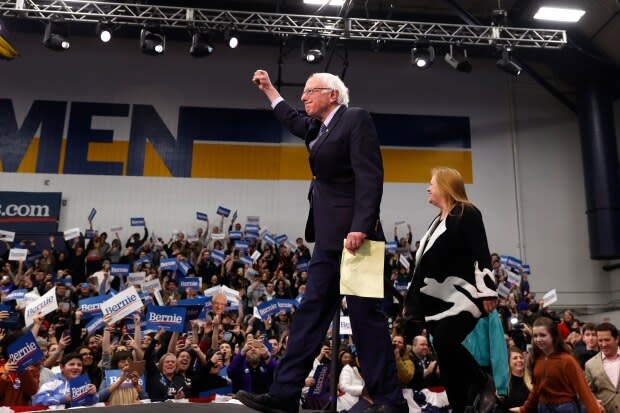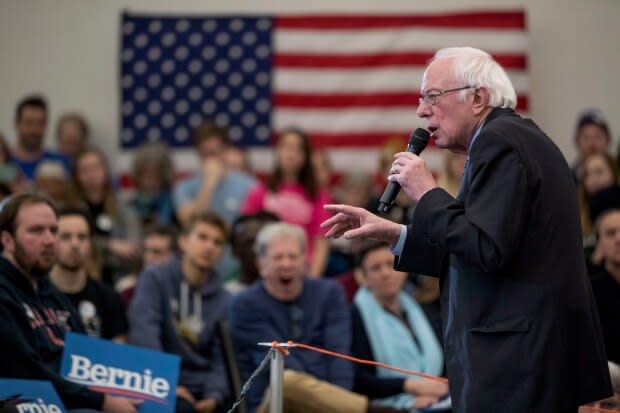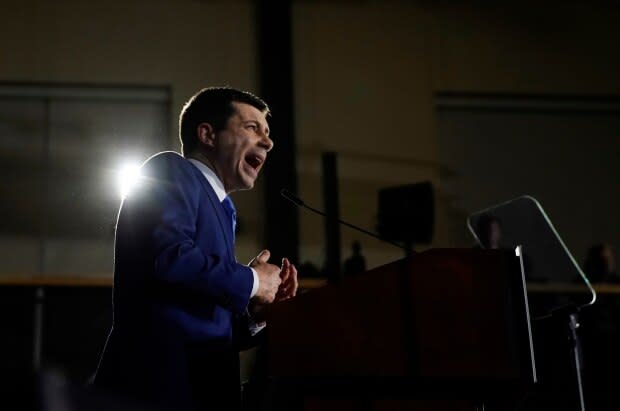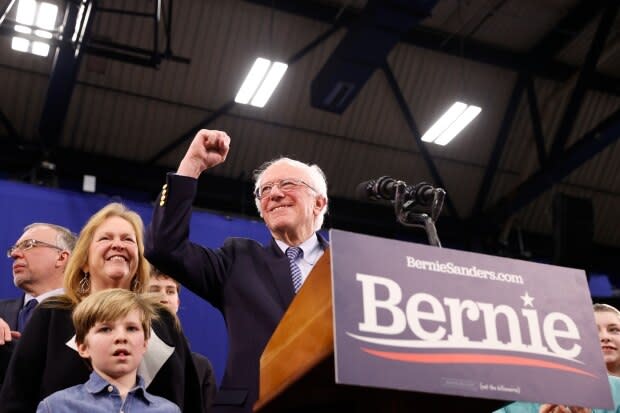Did a 'socialist' win New Hampshire? Can anyone but an 'oligarch' catch him?

Sen. Bernie Sanders won New Hampshire's "first-in-the-nation" primary last night and this morning the "also ran" campaigns face existential questions of varying urgency.
Can former vice-president Joe Biden recover in the more diverse South Carolina primary at the end of the month? Is the race over for Sen. Elizabeth Warren? Is "Mayor Pete" Buttigieg still the one on the move, or is it now Sen. Amy Klobuchar — or is neither going anywhere but down in the next vote and then eventually out?
There are questions that the country as a whole might suddenly find of greater interest: Is Sanders really a socialist? Is billionaire Michael Bloomberg really an oligarch? Does any of that matter for the November election?
A couple of weeks ago Sanders interrupted a CBS interviewer when she prefaced a question with "you're a self-proclaimed socialist."
"Democratic, put that in there please," Sanders politely directed her.
Presumably Sanders meant that he's really a democratic socialist, though some argue he should have said social democrat. The fact is he has also repeatedly described himself simply as a socialist — the CBS interviewer was correct when she said so; that's a matter of public record.

"In Vermont everybody knows I'm a socialist," he said in a 1989 speech, and mildly chastised progressives who fear using the word.
The 'socialist' label
In a 2009 newsletter to constituents, Sanders began with a chuckle about an Alabama Republican congressman. "I bet I'm the only socialist he knows," he wrote, before going on about middle class life in Finland.
By the end of that same newsletter Sanders was extolling the lessons the U.S. could learn from social democratic countries, which suggests he just wasn't all that fussy about labels back then. He was happy to associate himself with socialism writ large sometimes, and other times social democracy in particular— just as long as no one mistook him for a communist. He was always clear about that.
But it's understandable that journalists would describe Sanders as a "self-proclaimed socialist," partly because he's often said so himself and partly because defining him more precisely than that can be fraught.
A deep, dark rabbit hole beckons to those who want to pin down Sanders's ideology to its 12th decimal point of exactitude solely to fasten the most precise label to it. You get a sense of how fine the argument can turn from Marian Tupy's 2016 essay for The Atlantic magazine, Bernie is Not a Socialist and America is Not Capitalist.
Tupy argues Sanders is neither a socialist nor a democratic socialist — but a social democrat. You might read it and disagree. (Or you might be worn down by it and just give up trying to figure out any of it.)
WATCH | Katie Simpson talks to New Hampshire Democratic voters after the state's primary:
In any event, there are plenty of examples of Sanders filling in the blanks about himself in language plain enough that it doesn't take a political science PhD to figure it out.
Here he is from that same 1989 speech quoted above: "To me, socialism doesn't mean state ownership of everything, by any means, it means creating a nation, and a world, in which all human beings have a decent standard of living."
In any case, what's changed to bring out his persnickety side is less likely Sanders's thinking about socialism than his awakening to the broader reality that he's not just running in Vermont anymore.
A Gallup poll released Tuesday shows that of a range of possible presidential characteristics — race, religion, age — only socialism is a turn-off for a majority of Americans. Just 45 per cent say they could support a socialist for president. Even atheists do better at 60 per cent.
Socialist or not, Sanders can read a poll. And so his team has developed an aversion to a term he once promiscuously embraced. Likewise it's no wonder his political opponents — especially the Republican ones — want to make sure the socialist label follows him around like blackflies at a Vermont campground in springtime.
The Sanders team knows that game too. Lately, as they've sped along the campaign trail, they've noticed in the rear-view mirror that Bloomberg, the former New York mayor, has pulled into sight behind them. As he's gained on the Sanders team, they've taken to calling him an oligarch.

"We should not want the oligarchs or the plutocracy of this nation to be able to buy elections," said Sanders campaign co-chair Nina Turner on TV from New Hampshire Monday. She made a direct reference to Bloomberg, who is spending hundreds of millions of dollars of his multibillion-dollar fortune on his campaign.
"Oligarch" derives from ancient Greek and means "rule by a few." Normally when we hear it these days it describes billionaire Russians who made their fortunes in the fire sale (theft, some might argue) of state assets after the fall of the Soviet Union, and who maintain close ties to the Kremlin. From time to time, Russian oligarchs come up in news reports about Donald Trump and his real estate.
So it's not a neutral term, it's a pejorative. And naturally there are no speeches or public letters from Bloomberg proudly claiming he's an oligarch the way Sanders used to say he's a socialist.

The argument that Bloomberg is an oligarch is really an argument that the United States is an oligarchy, though it's hard to make a solid case for that conclusion.
But the view that it's moving in that direction is shared by some scholars who see the political influence of the super-wealthy class — the "one percenters" — growing commensurately with the almost unrestricted flow of their money into politics thanks to the roll-back of campaign finance regulations.
WATCH | Michael Moore on why he's backing Bernie to beat Trump:
The mere fact of the billionaire Bloomberg's self-financed campaign, then, is enough for some to conclude he is trying to buy the presidency, and that his success would be another step along the road to an oligarchy of sorts.
Sanders is not a Democrat and Bloomberg was a registered Republican when he ran for mayor of New York City. That stacked on top of everything else makes it hard to imagine a bigger bonfire of Democratic traditions than a showdown between them for the soul of the party this summer.


